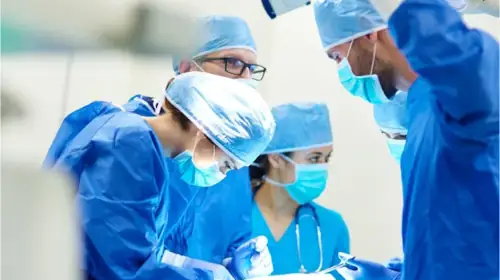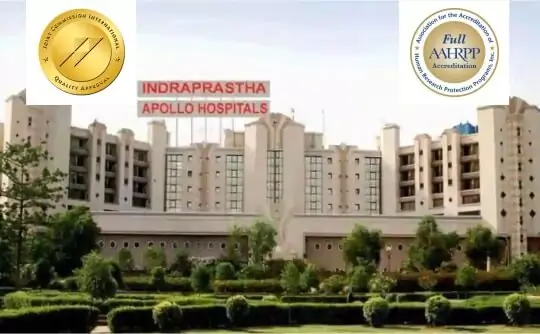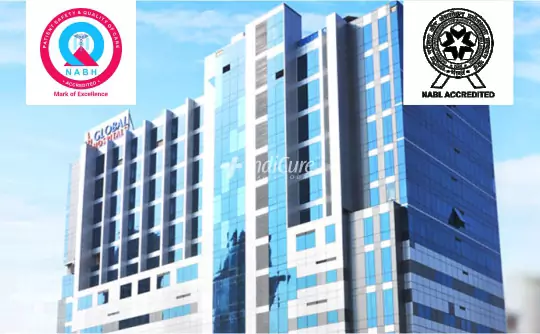

Whipple Surgery Cost in India starts from US $7,500 and varies depending on your medical condition and history, technique used for the surgery, surgeon, hospital and the city where you choose to get the procedure done.
There are different techniques to perform whipple surgery- open, laparoscopic and robotic. Your surgeon would advise the best technique for you depending on your medical history and health condition. The cost varies to a great extent on the technique through which the surgery is performed.
An important expense when it comes to your whipple surgery in India is going to be your surgeon's fees. IndiCure recommends highly experienced, skilled, board-certified surgeons who are capable of delivering successful surgeries. Although the charges may vary depending on the experience of the surgeon, you can be assured that you are in safe and skilled hands when you choose cancer treatment in India with IndiCure.
Having your whipple surgery done in an accredited surgical facility by skilled and qualified medical staff is a critical factor. Moreover, the geographical location of this facility in India also affects the quote. But, IndiCure provides you with a projected estimate that will be all inclusive and affordable.
The pre-surgical/treatment expenses are associated with the stage of the cancer and medical condition of the patient and thus the number and type of investigations and treatment required. Post-treatment expenses may include prescription medications and follow-up consultations.
We at IndiCure, understand that you travel with a budget in mind and do not like to be greeted by surprises after arrival in India. We thus club all these expenses and give you the package cost that is inclusive and affordable at the same time.
Your case manager shall give you an estimated cost of your surgery after discussing your medical reports with the surgeon. The final cost, however, shall be confirmed after your consultation with the surgeon.
In fact, we have Special Negotiated Rates with the Hospitals and you can avail Discounted Rates when you choose to Travel with IndiCure.


We Help you Choose the Right Treatment, Surgeon & Hospital

We Arrange Video/Telephonic Consultation with the Surgeon

We Assist you with Visa & Accommodation

We Receive you at the Airport and Drop you at Hotel/Hospital

We Assist you the at Hospital & Provide Post Operative Support

New Delhi
Indraprastha Apollo Hospitals, New Delhi is a state of the art multi speciality tertiary-care hospital situated in the most posh area of South Delhi. Considered to be the flagship hospital of Apollo group, Indraprastha Apollo Hospital is one of the important landmarks not only in Delhi, but in the world map because of its popularity among the medical tourists.

Mumbai
Gleneagles Global hospital in Parel, Mumbai is a 450 bedded multi super-specialty tertiary care hospital housed on 17 floors. It is the latest addition to the geographical footprints of the Gleneagles group in India. The unique feature of the hospital is separate Intensive Care Units for separate specialties viz Post Transplant ICU, Medical ICU, Cardiac ICU, Surgical ICU, Renal ICU.
Whipple procedure, also known as a pancreaticoduodenectomy, is a complex operation to remove the head of the pancreas, the first part of the small intestine (duodenum), the gallbladder and the bile duct.
The Whipple procedure is used to treat tumors and other disorders of the pancreas, intestine and bile duct. It is the most often used surgery to treat pancreatic cancer that's confined to the head of the pancreas. After performing the Whipple procedure, your surgeon reconnects the remaining organs to allow you to digest food normally after surgery.
A Whipple procedure may be a treatment option for people whose pancreas, duodenum or bile duct is affected by cancer or other disorder. The pancreas is a vital organ that lies in the upper abdomen, behind your stomach. It works closely with the liver and ducts that carry bile. The pancreas releases (secretes) enzymes that help you digest food, especially fats and protein. The pancreas also secretes hormones that help manage your blood sugar.
The goal of doing a Whipple procedure for cancer is to remove the tumor and prevent it from growing and spreading to other organs. This is the only treatment that can lead to prolonged survival and cure for most of these tumors.
The Whipple surgical procedure can be performed in three different ways.
While the minimally invasive surgical options come with less risk of blood loss and infection and a quicker recovery time there are also some drawbacks.
Laparoscopic and robotic surgeries both take longer to perform than an open surgery which is harder on the body. There is also the risk that there will be complications during a minimally invasive procedure that require the surgeon to switch to open surgery to finish the procedure.
Your doctor may recommend you have a Whipple procedure to treat:
We at IndiCure completely understand your concerns and it is always our endeavor to provide the best outcome for every patient. Following is the list of questions you must ask before you embark on your journey for whipple surgery in India.
Prepare to answer questions about your:

The surgeon makes an incision in your abdomen to access your internal organs. The location and size of your incision varies according to your surgeon's approach and your particular situation.
For a Whipple procedure, the head of the pancreas, the beginning of the small intestine (duodenum), the gallbladder and the bile duct are removed.
In certain situations, the Whipple procedure may also involve removing a portion of the stomach or the nearby lymph nodes. Other types of pancreatic operations also may be performed, depending on your situation.
Your surgeon then reconnects the remaining parts of your pancreas, stomach and intestines to allow you to digest food normally.
Your chances of long-term survival after a Whipple procedure depend on your particular situation. For most tumors and cancers of the pancreas, the Whipple procedure is the only known cure.
After discharge from the hospital, most people can return directly home to continue recovery. Some people are asked to stay nearby for several days for monitoring and follow-up visits. Older adults and people with significant health concerns may require a temporary stay in a skilled rehabilitation facility. Talk to your surgeon and team if you are concerned about your home recovery.
Most people are able to return to their usual activities four to six weeks after surgery. How long it takes you to recover may depend on your physical condition before your surgery and the complexity of your operation.
The pancreas is a vital organ that is located in the belly. It has a fish-like form to it. The head is the widest section on the right. The thin end is referred to as the tail, while the intermediate piece is referred to as the neck or body.
The pancreas produces hormones, aids digestion, and regulates blood sugar levels.
During the Whipple procedure, a GI surgeon trained to perform such procedures is assisted by a team of nurses, anesthesiologists, and anesthetists.
The Whipple technique is frequently performed open, despite the fact that laparoscopic surgery is suitable for many purposes.
The Whipple surgery is a lengthy process that takes anything from 4 to 12 hours to complete.
With pancreatic cancer, Whipple surgery improves your odds of long-term survival. Unfortunately, only a small percentage of people survive pancreatic cancer. Only approximately 8.5 percent of pancreatic cancer patients survive five years. Your chances increase to 25% if you get the Whipple procedure.
The Whipple procedure is a major operation. It will take some time to recover from the surgery.
After your Whipple procedure, you'll be in pain for a while. Your medical team will manage your pain and keep an eye out for signs of infection or other complications during your stay in the hospital. For a few days, you'll be on a clear, liquid diet until your healthcare specialists determine that you're ready to start eating solid foods. You would stay at the hospital under medical supervision for around 7-8 days after the surgery and would need to stay for around 2-3 weeks in India before you can go back.
When it comes to pancreatic cancer, the Whipple surgery is frequently the best option for a cure.The success or the cure rates, on the other hand, are influenced by the location and stage of your tumor, as well as other personal characteristics.
Your surgeon is the best person to answer this question after he has analyzed your health and medical reports if a Whipple treatment is likely to cure your pancreatic cancer.
One-third of those who have the Whipple surgery experience problems, which include: Diabetes, which can be on a temporary or permanent basis, fistulas, bleeding, infection, difficulty in digesting some foods, loss of weight, changes in bowel habits etc.
In the previous few decades, the Whipple procedure's survival rate has greatly improved. Thirty years ago, between 5% and 15% of persons who underwent the Whipple procedure died as a result of complications. Currently, the mortality rate ranges from 1% to 3%.
You'll spend roughly a week in the hospital after surgery to heal. Your care team will monitor your pain levels and keep an eye out for issues during your hospital stay.
It's a serious operation, and recovery will be lengthy. You should be able to resume your normal activities in around 4-6 weeks if there are no issues.
You'll be on a clear, liquid diet for the first few days after the procedure. Your surgeon will advise you when you should start eating solid foods. For a few days, you'll want to eat soft, easy-to-digest foods. You would be given a detailed diet plan by the dietitian in consultation with your surgeon.
Your surgeon will prescribe drugs to help you manage your pain after the Whipple surgery. Medications to prevent blood clots in your legs may also be prescribed.
The Whipple technique is a difficult procedure that carries a high risk of serious consequences. The procedure and associated consequences require a great deal of skill and experience.
The Whipple technique is, without a doubt, a difficult and painful process. This is owing to the size of the organs being removed or moved, as well as the proximity of the pancreas to nerves exiting the spine at the back of the abdomen during the procedure.
After a Whipple procedure, the five-year survival rate is around 20% to 25%.
Whipple surgery is a complex procedure that frequently results in significant modifications to the digestive tract. This can have major long-term consequences, such as abdominal pain, weight loss, digestive issues, and persistent weariness.
Following a Whipple treatment, you might expect to lose 5-10% of your body weight.
Traveling abroad for medical reasons may be challenging. With our experience of over a decade and working with the best surgeons and top hospitals in India, we help make your medical tour easier and safer for you. We will guide you at every step of the way and make end-to-end arrangements for your surgery, travel, and stay.
Ramandeep Dhaliwal
I had great experience having rhinoplasty through Indicure. Dr. Ruchika from Indicure has helped me in finding best plastic surgeon, answering all my questions...
Read More
Joshua Archer
My name is Joshua Archer I'm from New Zealand, bay of plenty, kawerau I opted for the bypass surgery in January 2023 but planned it in advance for 28 September found IndiCure...
Read More
Kera Ren
Absolutely loved my experience with IndiCure - from first inquiring to meeting the surgeon pre op to my follow up post op. The surgeon was extremely approachable...
Read More
Andreana Paul
Had a wonderful experience. Visited India for my plastic surgery. From sending mails, airport pickup, comfortable accommodation and, to smooth hospital appointment booking...
Read More
Brandi Luce
I had the privilege of using Indicure's services for a cosmetic procedure that I had wanted for a long time but had always been apprehensive about. Ruchika helped me...
Read More
Jade M
Indicure Health Tours went above and beyond my expectations. They helped me with every aspect of my journey and were professional, kind and caring. I was...
Read More
The content on the website (www.indicure.com) is intended to be general information and is provided only as a service. All photographs on our website of before and after results are examples only, and do not constitute an implied or any other kind of certainty for the result of surgery.
Learn about IndiCure Health Tours' comprehensive editorial policy that strives to deliver trustworthy, helpful, relevant, accurate and people-first content on medical tourism in India.
It is not medical advice and should not be taken as medical advice. It should not be used to diagnose or treat a health condition and is in no way meant to be a substitute for professional medical care. You are advised to see a surgeon in person to assess what surgery may or may not accomplish for you.
It is also important to keep your expectations realistic and to understand that all surgical procedures carry risks and should never be taken lightly.